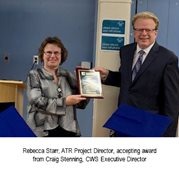Massachusetts Access to Recovery Program Receives Inaugural Community Partner Award from Boston’s Community Work Services

Community Work Services (CWS), a 140-year-old nonprofit in Boston, awarded its first Community Partner Award to the Massachusetts Access to Recovery (ATR) program at a ceremony in Boston on October 11. The award is given to an agency or organization that has helped make CWS’ success possible and supports its vision for Employment First. ATR supports Massachusetts residents in early recovery from opioid addiction and has developed a successful job training program with CWS for its ATR participants. ATR is funded by the federal government’s Substance Abuse and Mental Health Services Administration (SAMHSA) through grants to the Massachusetts Department of Public Health (DPH) Bureau of Substance Addiction Services (BSAS) and operated by Advocates for Human Potential, Inc. (AHP). Founded in 1877, Community Work Services helps people who face barriers to work obtain employment and achieve self-sufficiency through innovative job training, placement and support services.
CWS presented ATR with the award at a graduation ceremony for participants of the CWS job training program. ATR Project Director Rebecca Starr, who works for AHP, spoke to graduates and attendees about the importance of having confidence in their ability to work and the honor of receiving this award.
We are thrilled to be recognized as a successful and proactive partner with CWS, as it provides job training and opportunities to people with tremendous barriers to employment. The innovative ATR strategy for people suffering from addictions is a perfect complement to CWS’ work. ATR’s success is demonstrated by a fourfold increase in employment among participants after they complete the program compared to when they enrolled. Other tangible benefits to participants include low recidivism, high rates of abstinence from substance use, and economic stability. Thousands of ATR graduates are now better able to sustain recovery, find jobs, and maintain stable housing.
Rebecca Starr, ATR Project Director
My involvement with ATR goes back many years to when it was initiated as a federal program under President George W. Bush. The program was designed to support individuals who were beginning their long journey to recovery. To Massachusetts’ credit, the state has continued this very important program. A key tool of ATR is helping individuals to regain or initiate a career and employment goals. ATR has partnered with us, and several of today’s graduates were supported through ATR funding. . . . The opioid crisis gripping our country cries out for real recovery approaches such as ATR, and we are so fortunate to be involved in this program.
Craig S Stenning, CWS Executive Director
ATR individually tailors support for adults in early recovery by providing recovery services including care coordination; financial support for participants’ basic living needs (e.g., transportation passes, clothing, hygiene products, and government ID cards); individualized recovery coaching; and the Career Building Initiative (CBI), which helps participants explore careers, become job ready, and learn the occupational skills necessary to enter the workforce. The program operates in Boston, Worcester, New Bedford, and Springfield/Holyoke. More information about the ATR program and opportunities for job-training providers is available on the updated ATR website at http://www.ma-atr.org.
About Us
Advocates for Human Potential, Inc. (AHP) creates powerful solutions to improve health and human services systems. By partnering with the federal government, states, municipalities, healthcare systems, and nonprofits, we help people experiencing the greatest disadvantages lead full and productive lives. We are national leaders in training and technical assistance, research and evaluation, publishing, and dedicated consulting. On issues from workforce development to mental health, substance use disorders to housing and homelessness, we help our clients enhance behavioral health care through systems change. AHP was founded nearly 40 years ago to develop solutions for some of the biggest social infrastructure challenges across the nation. Our company has offices in metro Boston, Chicago, Los Angeles, Phoenix, and Tampa. Find out more at www.ahpnet.com.
For press inquiries, please contact newsroom@ahpnet.com.
